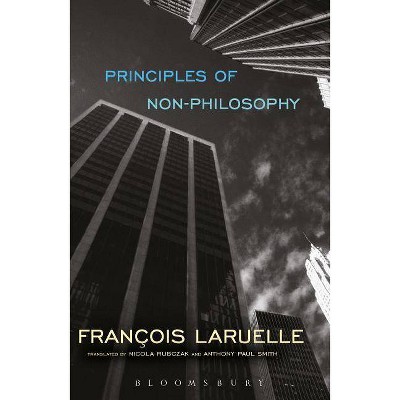Principles of Non-Philosophy - by Francois Laruelle (Paperback)

Product info
<p/><br></br><p><b> Book Synopsis </b></p></br></br><i>Principles of Non-Philosophy</i> is a treatise on the method, axioms and objectives of non-philosophy and represents François Laruelle's mature philosophy. <br/><br/>As well as presenting the method and principles of non-philosophy, it includes a history of the development of non-philosophy, a novel conception of science, a discussion of non-philosophical causality and new theories of the subject and object of thought. Providing an introduction to Laruelle's novel theory of 'non-epistemology' or 'unified theory of thought', this volumes challenges the way we think about the traditional philosophical problems.<br/><br/>Now available in paperback, this edition brings together all the elements of Laruelle's thought developed over twenty years and laying the foundations for his later work; <i>Principles of Non-Philosophy</i> is arguably his magnum opus.<p/><br></br><p><b> Review Quotes </b></p></br></br><br>At last Laruelle's first full articulation of non-philosophy is available in English, a book every bit as consequential as Deleuze's Difference and Repetition or Badiou's Being and Event. Here Laruelle takes two of the most appealing traditions in western thought, immanence and materialism, and drives them all the way to the end of the night. In so doing he ceases participation in philosophy entirely, forming no relation with it. Instead Laruelle runs along side philosophy, in parallel to it, subjecting philosophy's basic mannerisms to a more rigorous axiomatization. By withdrawing from the decision to reflect, Laruelle discovers the immanent destiny of nature, perhaps for the first time.<br><br>I am delighted to see the appearance of this English translation of <i>Principles of Non-Philosophy</i>, one of Laruelle's major works. The project is formidable: nothing less than "non-philosophy+?-as in "non-Euclidean+?- which is not the simple lack or absence of philosophy, nor what philosophy has marginalized, nor anti-philosophy, nor meta-philosophy, nor the end or death of philosophy. What's left? A withdrawal or suspension of the authority of philosophy in order to undertake a new practice of philosophy more "rigorous+? than philosophy, to think not "about+? but "from out of+? and "according to+? the non-objectifiable experience of what Laruelle calls radical immanence, the One, or the Real. It sounds at times not unlike Heidegger's idea that there is something to be thought in metaphysics to which metaphysics has no access. Our thanks to translators Nicola Rubczak and Anthony Paul Smith for their considerable labor in making the important work of this daring if daunting thinker accessible to Anglophone readers.<br><p/><br></br><p><b> About the Author </b></p></br></br><p>François Laruelle is Emeritus Professor at the University of Paris Ouest, Nanterre La Défense (Paris X) and lectures at the Collège International de Philosophie. He is the creator of the concept of 'non-philosophy', author of over twenty books, and director of L'Organisation Non-Philosophique Internationale. <p/>Nicola Rubczak is a PhD candidate at the Centrefor Research in Modern European Philosophy, Kingston University. <p/>Anthony Paul Smith is Assistant Professor in Religion at La Salle University and Fellow at the Institute for Nature and Culture, DePaul University.</p>
Price History
Price Archive shows prices from various stores, lets you see history and find the cheapest. There is no actual sale on the website. For all support, inquiry and suggestion messagescommunication@pricearchive.us